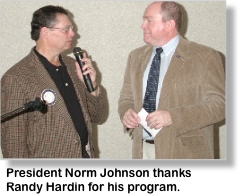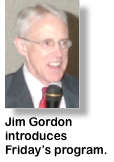|
||||||||||
 |
||||||||||||||||||||||||||
|
Vol. 17, No. 30, January 24, 2005 IN THIS ISSUE: This Reveille Home Page | The Friday Program: Preventing Falls in the Home — A Primer for Seniors | Peterson Picks up Rotarian of the Month Plaque | Annual Valentine Dinners | Tsunami Relief Tops $12,400! | Retention Team on the Prowl | Friday Potpourri | New Member Application Accepted by Board: Dan Geare | Student of the Month: Madeline Chang | Rotary First Harvest | Judge Jenny, the Sergeant at Arms | Web Fun |
||||||||||||||||||||||||||
|
||||||||||||||||||||||||||
|
The Friday Program:
The topic of the morning was Fall Prevention. Randy said the At Home Care system provides services to senior citizens, allowing them to stay in their home as long as possible. “When seniors fall, the consequences are serious. Their loss of independence is their number of one fear.” Hardin said his program is “keeping seniors on their feet.” He shared some statistics which bear out the severity of accidents:
“The bottom line is that fear of falling leads to a loss of confidence, a self-imposed isolation and immobility. It doesn’t have to be that way.” The Congress of the United States passed the Elder Fall Prevention Act of 2002. In this legislation, a fall is defined as: a person’s stability is perturbed and there is an inappropriate correction. Some of the red flags that can help determine if a person would be susceptible to a fall includes taking four or more medications, living in areas of poor lighting, having unstable chairs, and steep stairs with no adequate handrails. Loose carpets and lack of bathroom safety equipment are other areas to be improved. As people age, it is known that they make "inadequate corrections brought about by slowed reflexes and resulting in balance disorders which can provoke a fall. As people age, they suffer from osteoporosis caused by their bones becoming less dense. Risk factors for the older population includes low blood pressure and the onset of such diseases as Parkinson’s, Alzheimer’s and Diabetes,” Hardin said. There is evidence that heredity may play a factor if there’s a family history of falling. People suffering from foot disorders, a lack of exercise and/or a weakness of muscles and bone, and Osteoarthritis of the knees and hips are major risk factors.
If there’s deterioration in mental acuity, a senior needs assistance to make the assessment. They should take all pills (prescriptions and supplements) to their primary physician for evaluation. They should have their eyesight and hearing checked. Some tips to help prevent falls include wearing well-fitting slippers and clothing that don't impede walking. Seniors should tell their health care professionals about weakness in legs or feet. Reaching overhead can cause persons to lose their balance. Put necessities on lower shelves. Keep a sturdy stool handy. Picking up objects from the floor is the cause of many falls. Accidents happen in the bathroom often because of inadequate safety equipment. Install grab bars and purchase non-ski bath mats. When moving in and out of chairs, make sure they have sturdy and solid arms. Get mobility assistance from a cane or walker. Perform a complete home safety assessment. Throw rugs and trip hazards are accidents waiting to happen. Tack these down or remove altogether. Keep the walkways in the home free of clutter. Install night lights for dark hallways and stairwells. Have flashlights handy in case of trouble. Getting up from a fall may be as important as covering all the risk factors. If a fall should occur, and you are witness to it or find a person in that situation, leave the person on the floor. Cover them with a blanket, but don’t panic and take some time to assess the situation. Acquisition of emergency alarms at a cost of $40 a month is a good investment. Placement of telephones is important easy access for a person in a risk situation. What are known as "recovery bags" are available which contain a small blanket and a bottle of water.
For further information, call (425) 283-0408, At Home Care in Bellevue. For Randy Hardin’s presentation, a certificate noting a donation of 1220 pounds of Fresh produce has been made in his name to Rotary First Harvest. Thanks to Jim Gordon for his introduction.
|
||||||||||||||||||||||||||
 |
||||||||||||||||||||||||||
 |
||||||||||||||||||||||||||
|
CLICK HERE |
||||||||||||||||||||||||||
|
Reveille | Reveille Archives | Meeting Information | Calendar | How to Join the BBRC | Officers & Directors | Committees | Online Member Directory | Short Directory PDF File | Directory Info Form | Set Up User Info | Forgot User Info | Meeting Make-Up Form | Attendance Statistics | New Member Application (PDF File) | Expense-Funding Request Form (PDF File) | Rotary Foundation Pledge Form | District 5030 Website & Newsletter | 2004 Raffle Winner | About the Raffle | Email Us DISTRICT 5030 CLUB INFORMATION |
||||||||||||||||||||||||||



